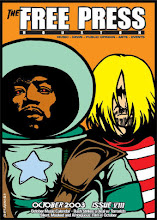Slumdog Millionaire
Slumdog Millionaire feels so accomplished, you are so completely overwhelmed by the storytelling and visuals that you have no choice but to surrender to its message. Danny Boyle has directed thrillers, sci-fiers, horror and fantasy and (with the exception of the zombie genre) he seemingly combines all these elements to tell the story of a chaiwalla (tea server) who wins the top prize in India's version of Who Wants To Be A Millionaire?
Jamal, an orphan from the slums of Mumbai, rises penniless to be a contestant on the show vying for 20-million rupees. The show's host and producer (Anil Kapoor) has Jamal arrested because he thinks the kid is somehow cheating. The police literally torture Jamal to get him to admit his crime yet the chaiwalla won't break - because he's innocent. The entire movie unreels in a non-linear fashion as the audience sees Jamal's life story (he's played by three actors as a youth, a teen, and a young adult). Through events that shape Jamal's personality we learn how he came to know the answers to the various questions.
But that's not what the film's about. Slumdog Millionaire is a remarkable story of enduring love. Boyle ratchets the tension to edge of your seat levels and you watch in anticipation, not of Jamal getting the answer right (although that's certainly a consideration) but whether he's able to reunite with his lost childhood love.
The story's taken from the novel by Indian diplomat Vikas Swarup titled Q&A and the script by Simon Beaufoy (The Full Monty) suggests that everything is one, from the lowest dregs of society to the highest aspirations as gleamed by great minds. Boyle provides urgency by constantly adjusting the shutter speed of this digitally shot film. The slow motion's no longer a camera trick but rather totally integrated into the action and through its layers remeniscent of the castes of society that play about in Boyle's self-proclaimed Dickinsonian creation.









0 Comments:
Post a Comment
<< Home